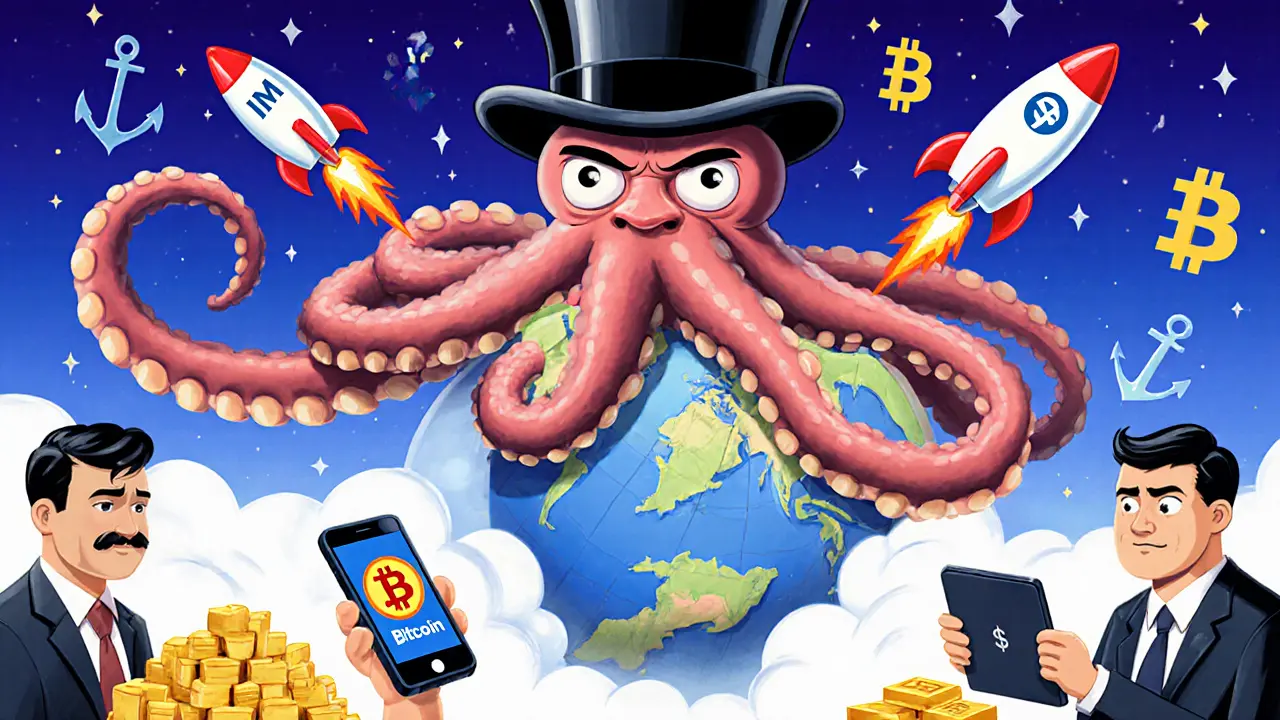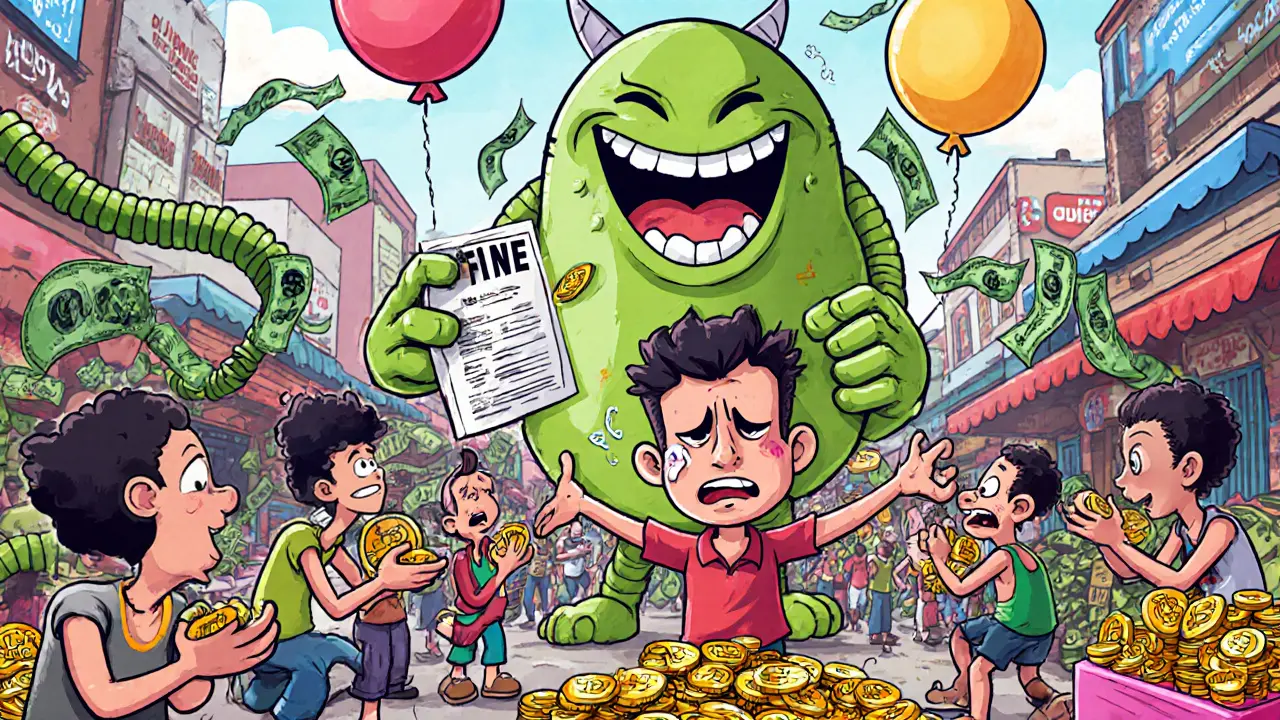Bitcoin Volatility Impact Calculator
How Bitcoin Volatility Affects Your Money
Calculate the impact of Bitcoin's price swings on your transactions. Based on real-world data from El Salvador's Bitcoin legal tender experiment.
Results will appear here
When El Salvador made Bitcoin legal tender in September 2021, it didn’t just make headlines-it triggered a global reckoning. For the first time ever, a country treated a decentralized cryptocurrency like the US dollar: as money you must accept. No choice. No opt-out. That single move forced the world to ask: Is this the future of money, or a dangerous experiment gone wrong?
What the Law Actually Did
El Salvador’s Bitcoin Law didn’t just allow Bitcoin payments. It made them mandatory. Under Article 7, every business, from a street vendor to a hospital, had to accept Bitcoin as payment for goods and services. If someone offered Bitcoin, you had to take it. And if you didn’t? You could be fined. The law also let people pay taxes in Bitcoin, settle old dollar debts with Bitcoin, and use it for any transaction without limits. The government backed it with a $150 million Bitcoin trust fund and launched the Chivo Wallet app, giving every citizen $30 in free Bitcoin just to download it. But here’s the twist: even though Bitcoin was now legal tender, the US dollar didn’t disappear. It stayed. El Salvador still uses the dollar for accounting, pricing, and most daily transactions. Bitcoin was meant to run alongside it-like a second currency you could choose to use. But the law didn’t give you the choice. You had to accept Bitcoin, even if you didn’t want it.Why the IMF and Global Banks Were Alarmed
The International Monetary Fund didn’t hold back. Within weeks, they called the move a “major risk” to financial stability. Their main worry? Volatility. Bitcoin’s price can swing 20% in a day. Imagine a farmer selling coffee for 1 Bitcoin. If that Bitcoin drops 30% overnight, his income vanishes. No central bank can step in to stabilize it. No one can print more Bitcoin if the economy slows down. The IMF also pointed to legal chaos. Most countries have laws that let businesses refuse cash-like a coffee shop that only takes cards. But El Salvador flipped that. Now, refusing Bitcoin could mean a lawsuit. Legal experts around the world, including Dror Goldberg, said this violates basic property rights. You shouldn’t be forced to take something you don’t trust, especially if its value can evaporate before you even cash it out. And then there’s money laundering. Bitcoin’s pseudonymous nature makes tracking transactions hard. Financial regulators in the US, EU, and UK worried El Salvador was opening the door to criminals. The FATF (Financial Action Task Force) warned that without strict KYC rules, Bitcoin could become a tool for tax evasion and illicit finance.The Crypto Community’s Cheerleading
Meanwhile, Bitcoiners celebrated. They called it the first real test of Bitcoin as money-not just speculation, not just tech, but actual currency in daily life. For years, crypto advocates argued Bitcoin could bypass broken banking systems. El Salvador, with 70% of its population unbanked, seemed like the perfect case study. If it worked here, it could work anywhere. Industry leaders like Michael Saylor and Cathie Wood praised the move as bold. They said it proved Bitcoin could function as legal tender without government control. For them, this wasn’t just about El Salvador-it was about the future of money itself. If a small nation could do it, why not others? But the cheerleading ignored a key fact: adoption wasn’t growing. It was collapsing.
The Reality on the Ground
The numbers tell a different story. Half of Salvadorans downloaded the Chivo Wallet at launch. But by early 2022, more than 60% of them hadn’t made a single transaction. One in five never even spent their free $30. And here’s the kicker: 88% of businesses that received Bitcoin immediately converted it to dollars. They didn’t want to hold it. They didn’t trust it. They just wanted to get rid of it. Only about 5% of all sales in El Salvador were paid in Bitcoin. And most of those were from people who were already tech-savvy, banked, young, and male. Not the unbanked. Not the rural poor. The people the law was supposed to help stayed out of it. Even the government’s own data showed the system was barely used. The average active user withdrew cash from a Chivo ATM less than 2.6 times a month. That’s not financial inclusion. That’s a handful of people playing with free crypto.Why Other Countries Didn’t Follow
Other nations watched closely. Nigeria, Jamaica, and the Bahamas all launched their own digital currencies-but they were central bank digital currencies (CBDCs). Controlled. Stable. Backed by the state. Not Bitcoin. Why? Because CBDCs let governments keep control. They can track transactions, freeze accounts, set interest rates, and prevent crashes. Bitcoin does none of that. El Salvador gave up monetary sovereignty. It can’t print money. It can’t adjust interest rates. It’s now at the mercy of a global, decentralized network it can’t regulate. Countries with inflation problems-like Argentina and Lebanon-still didn’t copy El Salvador. Why? Because Bitcoin doesn’t fix inflation. It just replaces one volatile asset with another. If your currency is collapsing, you don’t want to hold Bitcoin. You want dollars. Or gold. Or something stable.
The Bigger Picture: A Warning, Not a Blueprint
El Salvador’s Bitcoin experiment didn’t fail because Bitcoin is bad. It failed because forcing people to use it ignores human behavior. Money isn’t just code. It’s trust. It’s predictability. It’s the belief that what you’re holding today will still be worth something tomorrow. The world didn’t reject El Salvador because it was anti-crypto. It rejected it because the law was unrealistic. You can’t mandate trust. You can’t legislate adoption. People don’t use Bitcoin because a law says so. They use it because it’s easier, cheaper, or safer. And right now, for most people, it’s none of those things.What’s Next?
El Salvador still holds Bitcoin. It still accepts it. But it’s no longer a headline. The world moved on. The real story isn’t whether Bitcoin will replace the dollar. It’s whether any country will ever try to force it again. The answer? Almost certainly not. Other nations are watching El Salvador’s slow fade-not as inspiration, but as a cautionary tale. The path to cryptocurrency adoption isn’t through laws. It’s through utility. Through simplicity. Through real people choosing Bitcoin because it helps them-not because they have to. For now, the only thing El Salvador achieved was proving that money isn’t something you can mandate. It’s something you earn.Is Bitcoin still legal tender in El Salvador?
Yes. The law passed in 2021 is still in effect. Businesses are legally required to accept Bitcoin as payment. But in practice, very few do. Most convert Bitcoin to dollars immediately. The government still holds Bitcoin reserves and encourages use through the Chivo Wallet, but adoption remains low.
Why did other countries not copy El Salvador’s Bitcoin law?
Because the results were disappointing. Bitcoin’s volatility makes it risky for everyday use. Most businesses convert it to dollars right away, defeating the purpose. The law didn’t help the unbanked as promised-instead, it mainly benefited tech-savvy urban users. Other countries chose stable, government-backed digital currencies instead.
Did the Bitcoin law improve financial inclusion in El Salvador?
No. Despite the goal of helping the 70% of Salvadorans without bank accounts, research shows Bitcoin adoption was highest among those already banked, young, male, and urban. The unbanked rarely used the Chivo Wallet. Free Bitcoin bonuses didn’t change behavior-most people spent the bonus and never returned.
What’s the difference between Bitcoin and a central bank digital currency (CBDC)?
Bitcoin is decentralized-no government controls it. Its supply is fixed at 21 million. CBDCs are digital versions of national currencies, issued and controlled by central banks. CBDCs can be programmed, tracked, and regulated. El Salvador gave up control by adopting Bitcoin. Countries like Nigeria and the Bahamas kept control by launching CBDCs.
Can businesses in El Salvador refuse Bitcoin?
Legally, no. The law requires all businesses to accept Bitcoin as payment. But in reality, most don’t. Enforcement is weak. Many businesses ignore the rule because they don’t want the risk of Bitcoin’s price swings. The government hasn’t fined many companies, so compliance is mostly theoretical.
Why did the IMF oppose El Salvador’s Bitcoin law?
The IMF warned that Bitcoin’s extreme price swings threaten financial stability. It also raised concerns about money laundering, lack of consumer protection, and the loss of monetary policy control. The IMF argued that adopting a volatile, unregulated asset as legal tender puts the economy at risk without offering clear benefits.
How much Bitcoin does El Salvador hold now?
As of late 2025, El Salvador holds around 2,400 Bitcoin, acquired through government purchases during price dips. The value of this reserve fluctuates with Bitcoin’s market price. The government claims it’s a long-term investment, but critics argue the holdings are too small to meaningfully impact the economy.
Did the Chivo Wallet succeed?
Not as intended. Over 4 million Salvadorans downloaded it at launch. But usage dropped sharply. Most people used it only to claim their free Bitcoin and then deleted it. Less than 5% of all transactions in the country happen through Chivo. The app’s main function today is converting Bitcoin to dollars-not enabling Bitcoin payments.

Comments (17)
LaTanya Orr
November 22, 2025 AT 05:50
Money isn't code it's trust
That line stuck with me
People don't adopt something because a law says so
They adopt it because it makes their life easier
El Salvador tried to skip the part where you earn trust
And it backfired
Not because Bitcoin is bad
But because forcing people is just bad psychology
Ashley Finlert
November 24, 2025 AT 02:55
Ah, the grand theatrical experiment of modern monetary heresy.
El Salvador, that tiny beacon of defiance on the Central American coast, dared to cast aside centuries of fiat dogma-only to be met with the cold, calculating indifference of its own people.
One cannot legislate belief.
One cannot mandate faith in an asset that dances like a drunken spirit through price charts.
And so, the Chivo Wallet became a digital monument to well-intentioned folly.
The unbanked did not rise.
The technocrats did not triumph.
And the dollar-ever the quiet, unyielding sovereign-remained, unchallenged, in the pockets of the people.
This was not a revolution.
It was a performance.
And the audience? They simply walked out.
Chris Popovec
November 25, 2025 AT 17:51
This was always a psyop
Bitcoin was never meant to be money
It was a weapon against the fed
El Salvador got played
They thought they were the pioneers
Turns out they were the test subjects
Big finance let them do this so they could watch the collapse
Now they’ve got proof to scare every other country away from crypto
Classic move
They let the fool burn the house so the rest of us learn not to light the match
Peter Mendola
November 27, 2025 AT 09:03
Mandatory acceptance violates property rights. End of story.
Terry Watson
November 29, 2025 AT 04:14
This is the most beautiful failure I’ve ever seen!!!
Imagine trying to force trust!!!
Like telling someone to love you by law!!!
Bitcoin isn’t a tool-it’s a movement!!!
And movements don’t start with mandates-they start with magic!!!
El Salvador didn’t fail-they lit the spark!!!
People laughed, but now everyone’s watching!!!
The next country won’t force it-they’ll feel it!!!
And when they do? The world will change!!!
Don’t call it a flop-call it the first chapter!!!
sammy su
December 1, 2025 AT 01:03
most people just wanted to get the free btc and leave
no one actually wanted to use it
the law was nice in theory
but if your neighbor is gonna pay you in something that could lose half its value by lunch
you're gonna convert it fast
simple as that
Phil Taylor
December 2, 2025 AT 15:14
Typical third-world nonsense
They couldn’t even manage their own currency so they handed it to a speculative asset controlled by Americans in basements
And now they’re broke and confused
Don’t expect any real country to follow this clown show
Abhishek Anand
December 4, 2025 AT 10:08
The real tragedy is not the Bitcoin experiment
But the collective failure of human imagination
We have built civilizations on trust
Yet we treat money as if it were a mathematical abstraction
El Salvador did not fail because Bitcoin is volatile
They failed because they confused technology with transcendence
Money is not a ledger
It is a social contract
And no algorithm can replace the quiet dignity of a shared belief
vinay kumar
December 4, 2025 AT 22:13
people dont care about your bitcoin
they care about food
they care about rent
they care about not getting robbed
bitcoin does none of that
so why would they use it
simple
Lara Ross
December 6, 2025 AT 01:22
This is the most important case study in economic psychology of the decade!
Let me be clear: you cannot legislate adoption.
You cannot command trust.
You cannot force innovation through coercion.
El Salvador’s experiment was a masterclass in what NOT to do.
But here’s the silver lining-this failure is louder than any success.
It teaches us that real progress comes from utility, not mandates.
From ease, not enforcement.
From human choice, not government decree.
This isn’t the end of Bitcoin-it’s the beginning of better adoption strategies.
And that’s something to celebrate.
Leisa Mason
December 7, 2025 AT 20:15
So they spent $150 million to give people free crypto they didn’t want
And now the whole thing is a ghost town
Brilliant
Just brilliant
What a waste of time and money
And you call this innovation?
Rob Sutherland
December 8, 2025 AT 01:12
I think the real lesson here is that change doesn’t come from the top down
It comes from the ground up
People need to feel it, see it, live it
Before they’ll let go of what they know
El Salvador tried to skip the feeling part
And it didn’t work
But that doesn’t mean the idea is dead
Just that the timing was off
Frank Verhelst
December 9, 2025 AT 15:25
This is why I love crypto 💪
Even when it fails, it teaches us something real
People don’t want to be forced into the future
They want to walk into it on their own terms
Chivo Wallet might be dead
But the idea? Still alive
And next time? It’ll be smoother
And quieter
And way more powerful
Roshan Varghese
December 11, 2025 AT 06:53
you think this was about bitcoin
nah
this was about the fed losing control
they let el salvador do this so they could make crypto look bad
now every country is scared to touch it
and the banks keep printing
and the poor keep getting poorer
its all planned
Natalie Reichstein
December 12, 2025 AT 16:35
It’s pathetic how people think you can just slap a law on something and make it work
Like giving someone a violin and telling them to play Mozart
They didn’t fix financial inclusion
They just made people download an app they deleted the next day
And now the government’s stuck holding Bitcoin like it’s a cursed relic
What a mess
James Edwin
December 13, 2025 AT 12:39
The fact that 88% of businesses converted Bitcoin to dollars immediately tells you everything
It wasn’t about adoption
It was about survival
People aren’t rejecting Bitcoin because they hate tech
They’re rejecting it because it’s unreliable
And no amount of legislation changes that
Kris Young
December 14, 2025 AT 22:30
The law required businesses to accept Bitcoin. That’s clear. But enforcement? Almost non-existent. So the law exists on paper, but in practice, it’s irrelevant. People use dollars because they’re stable. That’s not a failure of Bitcoin-it’s a failure of the assumption that laws can override practical reality.